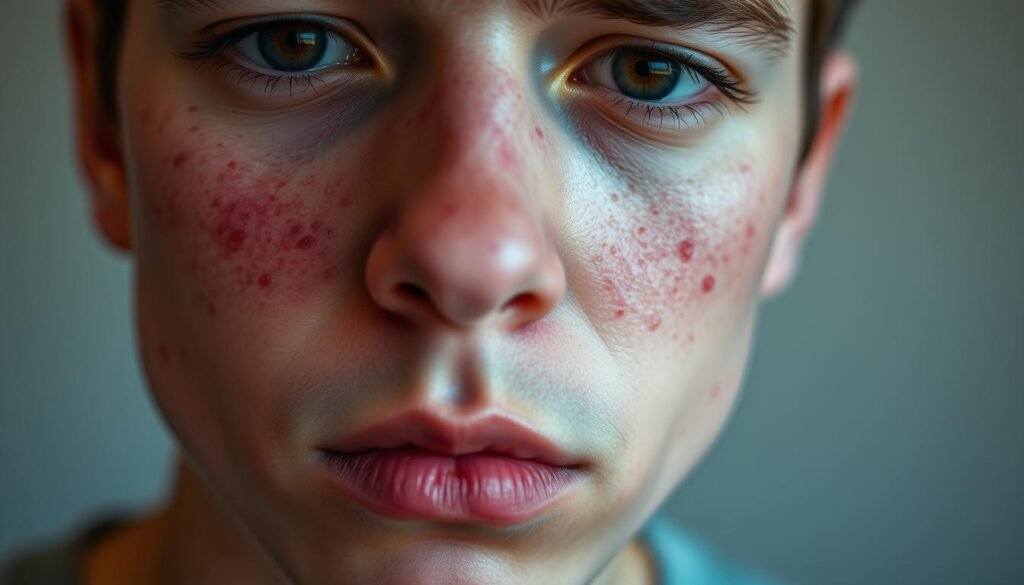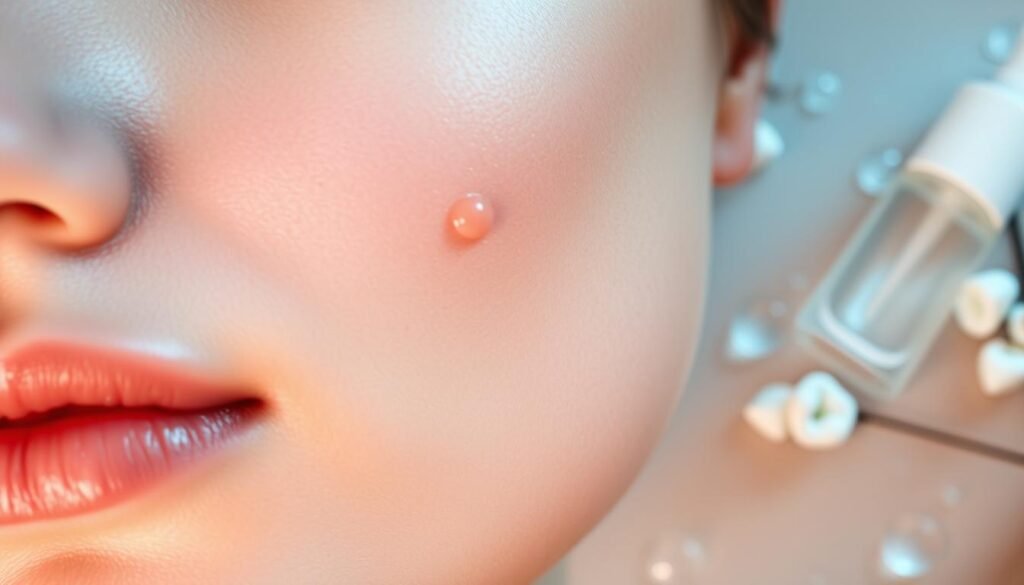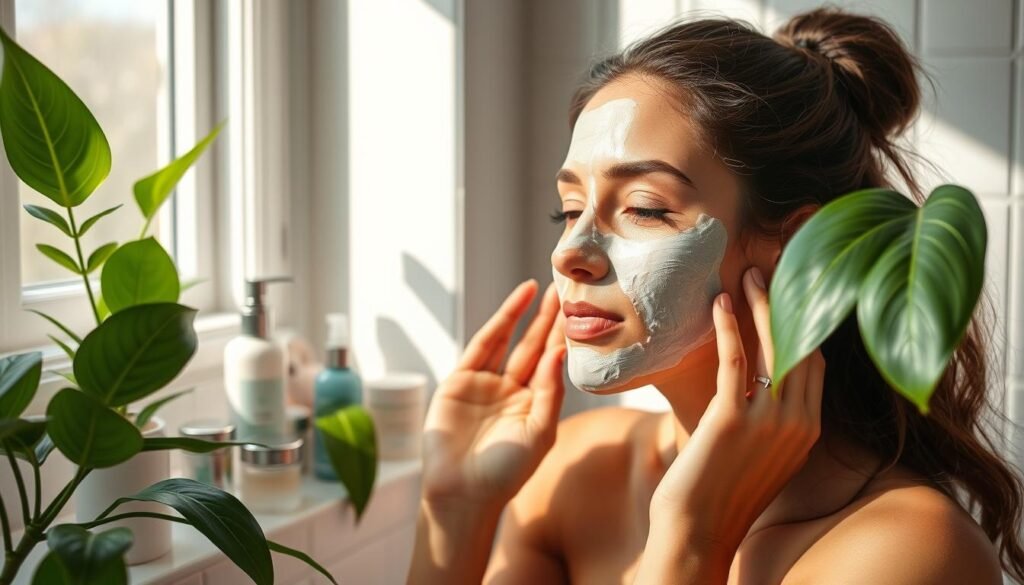Have you heard that young folks tend to have more breakouts on their cheeks and chin? This fact shows why knowing the meanings behind cheek acne is key. Cheek pimples can reveal much about a person’s health. They can be tied to stress, what you eat, your genes, and how well you clean your skin. In this guide, we’ll dive into how pimples on your cheeks connect to deeper health issues. This will shed light on a part of acne that many don’t fully grasp.
Key Takeaways
- Acne on cheeks indicates potential emotional or physical health issues.
- Understanding cheek acne meaning can lead to identifying various acne on cheeks reasons.
- Genetics and hygiene play crucial roles in the development of cheek acne.
- Hormonal changes and stress levels can significantly influence cheek acne severity.
- Your diet may also affect the occurrence and persistence of acne on cheeks.
- Face mapping guides can help link specific breakout areas to health concerns.
Understanding Acne: An Overview
Acne is a widespread skin issue that can affect anyone, no matter their age or gender. It starts when sebaceous glands make too much oil. This oil then mixes with dead skin cells, blocking pores. Blocked pores can lead to blackheads, whiteheads, and even cysts.
Many things can cause acne, like hormone changes, genetics, and the environment. The cheeks are just as likely to get acne as the T-zone. Understanding what does acne on cheeks mean shows us that the cheeks face the same risks as other parts of the face.
It’s crucial to know how acne forms to manage it well. Understanding the causes of acne helps people know their own triggers. Then, they can find the right treatments. You can learn more about the basics of acne at WebMD.
Acne Face Mapping and Its Origins
Acne face mapping is a technique that identifies zones on the face. Each zone is linked to different internal organs and health issues. This method has its roots in traditional Chinese and Ayurvedic medicine. For example, the cheeks are connected to the lung’s health, telling us that acne there might be due to poor lifestyle choices or internal health.
Here’s what each facial zone means:
- Forehead: Related to the digestive system’s health.
- Temples: Tied to kidney and bladder function.
- Cheeks: Connected to how well our lungs are working.
- Chin and Jawline: Linked with changes in hormones.
- Nose: Breakouts here signal oil gland issues or liver health.
Even though acne face mapping has historic roots, today’s science doesn’t fully back it. Experts say acne mainly happens because our faces have lots of oil glands. This leads to pore blockages, more than anything else.
Face mapping is still handy for figuring out why we get acne. It hints at possible reasons like bad hygiene or too much oil on our skin. By understanding it, we can better plan our skincare routines. This might just make our skin healthier.
What Does Acne on Cheeks Mean
Having acne on your cheeks means more than just skin deep issues. It suggests you might be facing emotional stress too. The acne can make a person feel less confident about themselves. Also, where the acne is on your cheeks could point towards different health issues. Knowing why acne appears can help in treating it better.
Link to Emotional and Physical Health
Stress is a big factor in causing cheek acne. When you’re stressed, your body makes more oils. This oil can trap bacteria, leading to acne. Anxiety can also make acne worse, showing the link between emotions and skin health. Not washing your pillowcases often or touching your face a lot can also make things worse.
Potential Internal Health Indications
Acne on the cheeks might mean there’s something off inside your body. Changes in hormones can trigger more oil and acne. Also, acne here might show problems with your digestive system. Taking care of your emotional health and keeping clean can help clear up your skin.
Common Cheek Acne Causes
Understanding the common causes of cheek acne is key to managing and preventing it. Three main factors contribute to cheek acne. They are genetics, hygiene practices, and bacterial transfer from everyday objects.
Genetics and Family History
Research shows genetics play a role in acne. If acne runs in your family, you might get it too. This means biological factors affect how skin reacts to different triggers. Knowing this can help people with acne find better skincare solutions.
Hygiene Practices
Keeping clean is vital for managing cheek acne. It’s important to wash your face and skincare tools often. Not cleaning things like makeup brushes or pillowcases can lead to more oils and bacteria. This can make acne worse. Also, harsh cleaners can dry out and irritate the skin, adding to the problem. A good cleaning routine can help keep these issues at bay.
Bacterial Transfer from Objects
Bacterial transfer from objects can cause cheek acne too. Cell phones and hats touch your face and bring germs. Cotton pillowcases and sheets can also hold bacteria and dirt, making acne worse. Keeping personal items clean and good hygiene habits can help stop cheek acne from starting.
| Cheek Acne Causes | Details |
|---|---|
| Genetic Predisposition | Increased likelihood of breakouts due to family history. |
| Poor Hygiene Practices | Neglecting to clean makeup brushes and pillowcases can exacerbate acne. |
| Bacterial Transfer | Germs from phones, sheets, and other objects can contribute to skin irritation. |
Hormonal Cheek Acne
Hormonal changes are key in hormonal cheek acne’s development. This acne often pops up with hormone level changes. This is especially true during the menstrual cycle.
Women may see more acne before their period. This is due to increased androgens. These hormones cause more oil production. This leads to clogged pores and cheek breakouts.
Your Menstrual Cycle
The link between menstrual cycles and acne is clear. Many women get more acne before their periods. This happens because androgen levels go up.
In studies, 55% of women with hormonal acne had high androgens like DHEA. This hormone surge makes skin oily and more prone to acne.
Hormonal Fluctuations in Adults
Adult women can also have hormone changes. These changes may come with pregnancy or perimenopause. Hormone shifts during these times can cause lots of acne.
It’s smart to check androgen levels regularly if you have adult acne. Conditions like Polycystic Ovarian Syndrome can make it worse. Anti-androgen meds can help, but they might take time to work.
Stress-Induced Cheek Acne
Many people suffer from stress-induced cheek acne when facing tough situations. Stress makes the body respond by changing hormone levels. This can make acne worse, especially on the cheeks. When we’re stressed, our bodies release more hormones like cortisol. These hormones can make the sebaceous glands produce more oil. This often leads to more breakouts.
The Body’s Response to Stress
Studies show that stress affects acne in a lot of people. For those who often get breakouts, stress can make it worse. Stress can also slow down the healing process of pimples. That’s why managing stress is key to acne care. People with oily skin or big pores should pay extra attention to how stress affects them. This can help avoid more breakouts.
Finding Effective Stress Relief Techniques
Reducing stress can really help improve your skin. Deep breathing, mindfulness, regular exercise, and good sleep can all help. Eating healthy is also good for your skin. By managing stress and taking care of your skin, you can fight stress-induced acne. This approach will help you feel better emotionally and have clearer skin.

Diet-Related Cheek Acne
What you eat can really affect your cheek acne. Sugary foods and dairy are big triggers. They cause inflammation and hormone changes, leading to pimples.
Impact of Sugary Foods
Eating lots of sugar is bad for acne. It makes insulin levels spike, causing more oil on your skin. This oil gets mixed with dead skin and clogs your pores, causing acne. Foods high in sugar and bad fats are major culprits.
Role of Dairy in Acne Development
Dairy and acne often go hand in hand. It’s been found that dairy, especially skim milk, makes your body produce more oil and inflammation. If you eat a lot of dairy, you might get more pimples. It’s important to watch how much dairy you eat for your skin’s sake.
Eating healthy helps with acne. Include lots of whole foods, like leafy greens, nuts, and foods with probiotics. Cutting down on sugar, bad fats, and dairy is a good plan for clearer skin and preventing acne.
| Dietary Triggers | Effects on Skin |
|---|---|
| Sugary Foods | Increase in insulin levels, leading to sebum production and clogged pores. |
| Dairy Products | Higher sebum production and inflammation, particularly from skim milk. |
| Trans Fats | Cause inflammation, contributing to acne flare-ups. |
| Caffeine | Can trigger increased hormone production, exacerbating acne. |
| Refined Carbohydrates | Stimulate insulin secretion, promoting acne development. |
Hygiene and Cheek Acne
Keeping a high standard of hygiene is key in fighting cheek acne. It starts with washing your face regularly and following a skincare routine. Oils, dirt, and bacteria build up can clog pores. This makes the cheeks more prone to acne. Clean habits are crucial in lowering acne risk.
Importance of Clean Skin
Clean skin doesn’t just help fight acne; it also improves skin health. Things that lead to cheek acne include:
- Oil buildup in pores
- Use of skincare products that clog pores
- Not cleaning makeup brushes
- Germs from phones and surfaces
- Using dirty pillowcases
- Touching your face often
To lower the chances of acne, stick to a face-cleaning routine. Wash your hands often. Also, clean your phone and other things that touch your face.
Keeping Makeup and Hair Products in Check
The makeup you choose affects cheek acne. Use non-comedogenic products because they don’t clog pores. Also, ensure your makeup brushes are clean to prevent bacteria spread. Avoid heavy hair products as they can make acne worse.

Being aware of skincare and makeup routines helps keep your skin clear and fights cheek acne.
Cheek Acne Treatments
Finding cheek acne treatments requires a mix of over-the-counter options and prescribed methods. It’s important to know what causes the acne, like oily skin, hormonal shifts, and your daily habits. This understanding helps in fighting the acne effectively.
Over-the-Counter Solutions
For mild acne, over-the-counter solutions are usually tried first. They have salicylic acid or benzoyl peroxide. These ingredients help by cleaning out pores and lessening swelling. They tackle the bacteria that cause acne and remove dead skin cells. Some common products are:
- Salicylic acid gels or creams
- Benzoyl peroxide washes
- Sulfur-based treatments
- Resorcinol creams
Prescription Options and Dermatological Advice
If cheek acne is stubborn, you might need prescription medicine. Seeing a dermatologist is crucial to finding what works best for you. At Pandia Health, you can get advice tailored to your needs, like:
- Topical retinoids for better skin renewal
- Oral antibiotics such as tetracycline or doxycycline for tougher cases
- Hormone-based treatments like birth control pills or spironolactone
The service at Pandia Health comes with a $35 consultation fee. This fee also covers getting your medication delivered. Choosing the right treatment can make a big difference in fighting cheek acne.
Preventing Acne on Cheeks
Preventing acne on your cheeks starts with good habits and smart choices. It’s important to know what causes acne on cheeks. These can be oily skin, changes in hormones, and germs. Knowing these causes helps you avoid breakouts.
Establishing a Consistent Skincare Routine
Having a skincare routine for acne prevention is key. Clean your face gently but well, morning and night. Use products that won’t irritate your skin. It’s also good to use lotions that won’t block your pores.
Change your pillowcases often and clean your phone to kill germs. Products with salicylic acid and benzoyl peroxide are great for fighting acne. They can stop new pimples and clear up your skin.
The Role of Diet and Lifestyle Choices
Your habits have a big impact on acne. Eating less sugar and dairy can help your skin. Drink lots of water and exercise to keep your skin and body healthy. This also lowers stress, which can cause pimples.
Avoid wearing tight stuff that rubs against your face. Making smart food choices and staying clean can seriously help your skin. For more tips on keeping your cheeks clear, check out Pandia Health and face mapping techniques.

Conclusion
Understanding cheek acne is key to managing and preventing it. This overview shows hormonal changes, hygiene, and diet are big factors. Knowing this helps people choose the best skincare and health actions.
Keeping a regular skincare routine and changing your lifestyle helps a lot. Face mapping can show health problems based on where acne is on your face. This helps pick the right treatments.
To get clear skin, you might need several strategies. This includes getting advice from skin doctors. With good info and help, you can fight cheek acne. This makes your skin clearer and boosts your confidence. Read more about acne and health here.